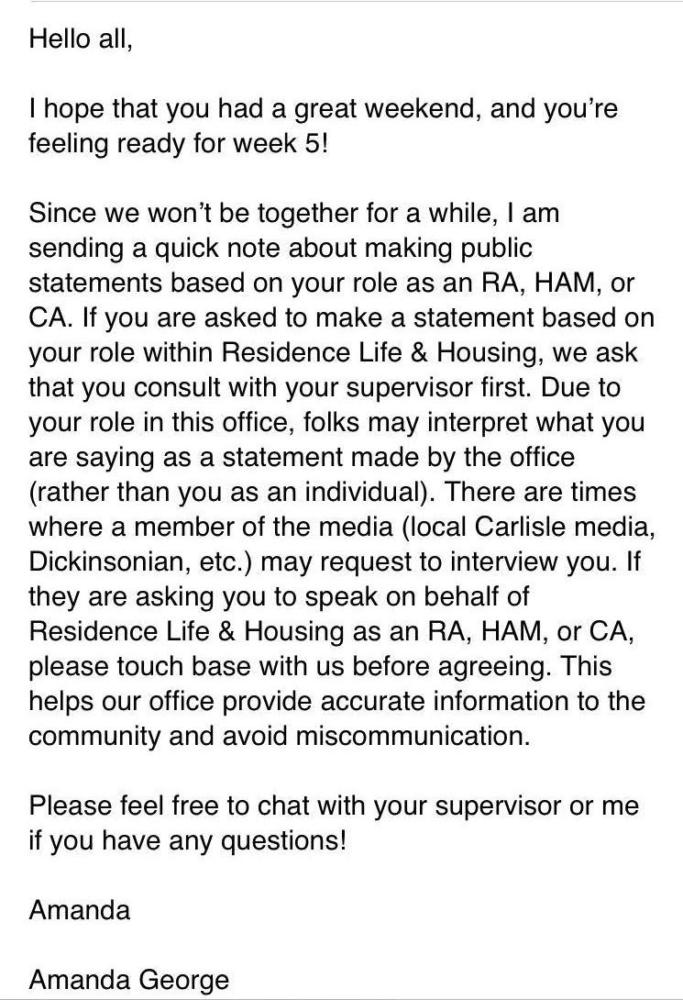Letter from the Editor: Restricting Employees’ Freedom
The Dickinsonian exists for one reason only: to report the news of the Dickinson College campus and its residents. It neither exists to promote the college in any way, nor to portray the college negatively.
In order to accurately do our job, we need to be able to access campus resources, which includes students, faculty and administrators. For the most part, getting to talk to so many people in countless disciplines, departments and organizations is one of my favorite aspects of being a journalist at Dickinson. However, we run into major problems if these resources are intentionally denied to us as we can no longer fulfill our duty to report all the information pertaining to a story.
It was brought to my attention by several RAs that they received an email on Monday, Sept. 25 regarding speaking to media outlets, citing The Dickinsonian specifically. The email asks students who are RAs, HAMs or CAs to consult with their superiors before making any on-record comments to the media relating to their roles in the aforementioned positions. The email frames this request as a way to prevent miscommunications so that “folks” don’t assume the student is speaking on behalf of Res Life.
This request is arguably reasonable at the surface, except that the idea that absolutely anything these students say as an RA may be interpreted as coming from the office is ridiculous. The justification given in this email is simply not convincing. Additionally, almost every student on this campus is heavily involved. RAs are students that affiliate themselves with many clubs, organizations, jobs and internships. The ambiguity of the request is a muddy area; when does it count that a student is speaking as an employee of Res Life and not as a resident of the dorm in general? As a Dickinson student? As an intern of a local, national or international company?
All that a student would have to say in this case is that they are speaking as an individual (as an RA, as a student of Dickinson, as a student of many different affiliations,) but not on behalf of the Res Life Office. The Dickinsonian would be delighted, and ethically obligated, to include such a disclaimer in the article. This is exactly the same concept that Dickinson students have encountered with numerous Clarke Forum panels which feature a member of the U.S. Army War College. The speaker always precedes his/her/their two cents with a disclaimer that his/her/their beliefs do not reflect the beliefs of the U.S. Army War College. Imagine if the president of a college required that faculty check in with them before they issue statements to the media? If guest speakers had to consult with their numerous companies and affiliations before giving lectures and speaking in classes? If every employee had to call their employer before sharing their views on their field of work? No one would stand for it.
As such, all that Residential Life would have to do, if they were really so concerned, was remind their student employees to precede comments made to the media relating to their job as an RA with a similar disclaimer.
Rules such as these renders murky the freedom of RAs to address issues and speak about situations that matter in their own dorms. Stating that your employees should get permission before speaking to the media has a chilling effect on the ability of the RA to speak freely as a member of the Dickinson community. Furthermore, restricting the freedom of RA’s to talk to the press treats them as untrustworthy threats to the functioning of Res Life as an office.
This week, we ran an article about reports of bugs in dorm and academic buildings. We had quotes from several RAs and students alike, but as soon as the story idea was leaked to the greater Dickinson community, the email was sent out. Several RAs retracted their statements and many more refused to comment in the first place. Here is a case where the RAs who we interviewed were not being asked to speak for the Res Life Office, but just about a situation in their own dorm rooms. And yet, we have been stonewalled. Numerous RAs who had statements that would have been incredibly interesting and supplemental to the article were quite literally scared to share their experiences with bugs, going as far as asking if they could be quoted anonymously.
Why would an employer attempt to restrict their employee’s speech? Is it truly just for the sake of preventing a miscommunication? Or is it due to a concern about what the employees might reveal about a certain situation or department?
These practices put the press, which is The Dickinsonian, in the position of having to wait for clearance to simply ask a question. The news cannot afford to wait, especially not in the name of violations of freedom.




